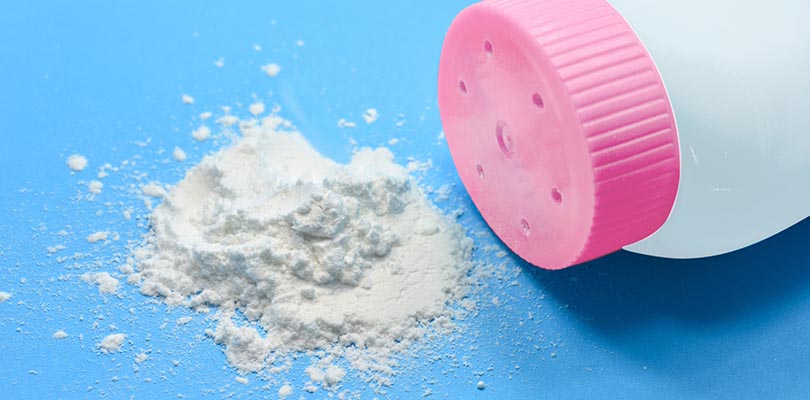Ovarian Cancer and Talcum Powder
Talcum powder is a quick fix to absorb moisture, cut down on chafing, and freshen up. Many beauty products contain talcum powder, and the powder's versatility makes it a go-to in many make-up kits. It seems like a great invention; however, over the last few decades, there have been more claims that talcum powder is linked to ovarian cancer.
What Is Talcum Powder?
For those unfamiliar, talcum powder is also referred to as baby powder. The powder absorbs moisture and helps cut down on friction. It's used to keep skin dry and prevent rashes. This powder is widely used in cosmetic products and body and facial powders (in addition to other consumer products).
Talcum powder is made from talc, a mineral mostly made up of the elements magnesium, silicon, and oxygen. Some talc contains asbestos, which is a substance known to cause cancers in and around the lungs when inhaled.
The Link Between Ovarian Cancer and Talcum Powder
Findings have been mixed regarding the possible link of talcum powder and ovarian cancer.
There is growing evidence that suggests that using talcum powder in the genital area can increase the chance of a woman developing ovarian cancer. Women who have used talcum powder are about 30% more likely to be diagnosed with ovarian cancer than women who have not (based on several research studies).
Studies have found talc particles in the cancerous tissues of women who died from ovarian cancer, which may be the result of the products they were using.
Does Talcum Powder Cause Ovarian Cancer?
Currently, there are no recommended tests to screen for ovarian cancer, so often it is not diagnosed early. In instances where ovarian cancer is found in early stages, a woman has over 90% chance of surviving at least five years after the diagnosis.
Case-control studies (where most of the evidence comes from) cannot show for certain that talcum powder causes ovarian cancer, but they can tell us whether women, who report using talc in the genital area, are more prone to develop ovarian cancer.
Talcum Powder and Asbestos
Asbestos contamination is likely the reason talcum powder is linked to cancer. If the talc is not wholly purified, traces of asbestos or asbestiform fibers can remain in the final product (a fact which has been backed by research).
It's important to differentiate between talc that contains asbestos and talc that is asbestos-free. Talc with asbestos is generally accepted as being able to cause cancer if it's inhaled. It's suggested that talcum powder may cause cancer in the ovaries if the powder particles were to travel through the vagina, uterus, and fallopian tubes to the ovaries.
Today, talcum powder is tested to ensure that it doesn't contain asbestos. If you purchase talcum powders made with cornstarch, it does not increase the risk for ovarian cancer.
Acute myelogenous leukemia (AML) is a type of blood cancer. It typically starts in the bone marrow where blood cells are made.
Talcum Powder and Cancer Lawsuits
Many women and families have filed lawsuits against manufacturers of talcum powder (mostly Johnson & Johnson). People pursue these lawsuits for several reasons:
- To hold the company accountable for the liability
- Prevent future harm to other consumers
- Get a settlement to cover medical expenses
Some information on talcum powder lawsuits and high-profile cases are listed below:
- Over $5 billion has been awarded to plaintiffs in ovarian cancer lawsuits citing talc in the products as the reason for diagnosis.
- More than 9000 cases have yet to be settled, with more lawsuits being filed on an on-going basis.
- Since 2013 Johnson & Johnson has been brought to court by families of women who used their talcum powder products and died from ovarian cancer.
- The first lawsuit was won in 2013, and during the trial, a Johnson & Johnson attorney admitted that the company knew of the link between talcum powder and cancer but did not warn consumers as they viewed the risk as insignificant.
- In 2016, courts awarded $55 million to a woman who underwent several surgeries, including a hysterectomy, due to ovarian cancer.
- In 2016, a woman with ovarian cancer won a $70 million-dollar suit against Johnson & Johnson after using their talcum powder for four decades.
- In 2016, the family of a woman who died from ovarian cancer was awarded $72 million by a jury when it was determined she died of the cancer following decades of talcum powder use.
- In 2019, A jury ordered Johnson & Johnson, Colgate-Palmolive, and Avon to pay a combined total of $12 million to a woman as a result of her talcum powder-related mesothelioma.
The fight continues for fair warning labels on all talcum products by some of the big beauty companies. Other companies already carry the warning about frequent application in the genital area may increase the risk of ovarian cancer.
Until more information is available to prove that talcum powder causes cancer, those who are concerned may want to limit or avoid their use of consumer products that contain talcum powder. Always read the list of ingredients and try to stick with natural remedies if possible, to reduce your risk.







